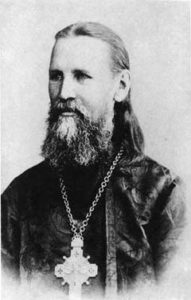SSCORRE!
Saint Sophia Cathedral
Online Resources for our Religious Edification

Topic of the Week – On Where We Derive Our Peace and Security
“A person who owns nothing — or, more precisely, who desires to own nothing, and regards nothing as a personal possession– in spirit owns everything. He can look at a beautiful valley, regardless of who the legal owner is, and rejoice in its beauty. He can look at any fine building, and marvel at the artistry in its construction. He can use any tool which someone lends him, and admire the skill with which it was designed.
The man who owns much and is concerned only with the things he owns – in spirit owns nothing. He cannot admire the beauty of any part of God’s creation unless he is the legal owner. He cannot rejoice in the artistry of any building unless it belongs to him. Beauty and artistry belonging to other people simply evoke jealousy and envy in his breast. And even the things which he does own cause him no lasting pleasure, because as soon as he has acquired one thing, he is calculating how he can acquire another.
Those who are poor are the truly rich; those who are rich are the truly poor.“
Excerpted from On Living Simply: The Golden Voice of Saint John Chrysostom by John Chrysostom), p37Adult/Family:
“Some people see the houses in which they live as their kingdom; and although in their minds they know that death will one day force them to leave, in their hearts they feel they will stay forever.
They take pride in the size of their houses and the fine materials with which they are built. They take pleasure in decorating their houses with bright colors, and in obtaining the best and most solid furniture to fill the rooms. They imagine they can find peace and security by owning a house whose walls and roof will last for many generations.
We, by contrast, know that we are only temporary guests on earth.
We recognize that the houses in which we live serve only as hostels on the road to eternal life.
We do not seek peace or security from the material walls around us or the roof above our heads. Rather, we want to surround ourselves with a wall of divine grace; and we look upward to heaven as our roof. And the furniture of our lives should be good works, performed in a spirit of love.”
Excerpted from On Living Simply: The Golden Voice of Saint John Chrysostom by John Chrysostom), p11
Preschool/Elementary:
“A man decides to build a house. He digs down into the earth until he reaches solid rock, and then lays the foundations. He collects great lumps of stone, hews them into regular shapes, and puts them one on top of the other to make walls. He goes into the forest to chop down trees, when he saws into rafters for the roof. He digs out clay, and bakes it into tiles to put on the roof. At last his work is complete. He stands back and admires his achievements. “Nothing can destroy such a strong building,” he says to himself; “my house will last forever.“
Certainly such a man is skilled with his hands; but he is totally unskilled with his soul.
Even if his house were to last forever, it is utterly irrelevant to him. He may be struck down by an accident or a disease within a few days. He may survive his full span, but as the breath leaves his body, his house will count for nothing. He might just as well have built himself a shelter from sticks and mud and used the time saved to concentrate on the salvation of his own soul.
“Excerpted from On Living Simply: The Golden Voice of Saint John Chrysostom by John Chrysostom), p32What did the man spend his time on? Why is the man’s house ‘irrelevant’ [having no importance] to him? What really matters – was it what he was spending his time on? What types of things do we spend our time on? What really matters for us and is that what we are spending our time on?
Middle School:
“As much as possible, love the desert and the immaterial life, and fly from your material possessions to the fold of the poor. Simplify your life so as to be freed from worldly anxiety, so that your life might have meaning.” Saint Paisios the Athonite
Excerpted from Precious Vessels of the Holy Spirit, p136
High School:
“The person who is possessed by material things is always subjugated to unhappiness and anxiety: he trembles for fear, on the one hand that his things will be taken away from him, and on the other, that his soul be taken from him. Now, the miser whose hand is sore from his tight hold on his possessions had also squeezed his own heart, turning it into stone. In order for him to be healed, he must visit unhappy people, to suffer, so that slowly, slowly, he is forced to open his hand and his heart of stone will start to soften. It will become a human heart, and in this way the gates of Paradise will also open.” Saint Paisios the Athonite
Excerpted from Precious Vessels of the Holy Spirit, p131
A Message from Maria Spanos
I am passionate about our Orthodox Christian faith and seek to help others learn as much as they can about it. My purpose here is to share online resources that help strengthen our relationship with Christ and bind us closer to His Church. I believe they are invaluable in learning about our precious Orthodox Tradition, and are a great aid for teaching family members, friends and others about Orthodoxy. ~Maria
Two of my favorite quotes:
 “A true Christian behaves in this life so that it may be a preparation for the future one and not only a life here below. In his actions, he does not think what will be said of him here but of what will be said there in heaven; he represents to himself that he is always in the presence of God, of the angels and all the saints, and remembers that someday they will bear witness of his thoughts, words, and deeds.” — Saint John of Kronstadt
“A true Christian behaves in this life so that it may be a preparation for the future one and not only a life here below. In his actions, he does not think what will be said of him here but of what will be said there in heaven; he represents to himself that he is always in the presence of God, of the angels and all the saints, and remembers that someday they will bear witness of his thoughts, words, and deeds.” — Saint John of Kronstadt
__________________________________________________________

“Of all the holy works, the education of children is the most holy.”
— St. Theophan the Recluse






